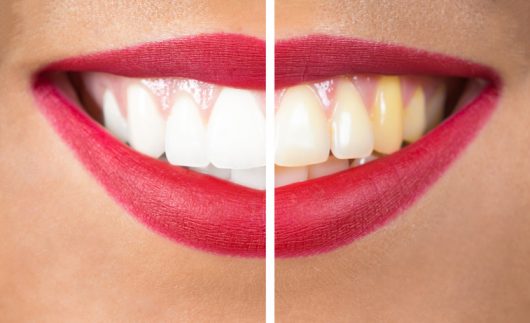
 While everyone likes the idea of having a perfectly white teeth, the reality is that normal teeth are somewhat yellowish in color. This can happen for a number of reasons, but usually it’s because the yellower layers of your teeth underneath the outermost layer shines through. But while some people have minor discoloration that’s barely noticeable, others struggle with teeth that are an unsightly yellow color.
While everyone likes the idea of having a perfectly white teeth, the reality is that normal teeth are somewhat yellowish in color. This can happen for a number of reasons, but usually it’s because the yellower layers of your teeth underneath the outermost layer shines through. But while some people have minor discoloration that’s barely noticeable, others struggle with teeth that are an unsightly yellow color.
If you have yellow teeth, you’ll know that tooth yellowing isn’t caused by poor dental hygiene. Even if you brush twice daily and floss regularly, your teeth can yellow for other reasons. Regardless, having yellow teeth is likely to make you feel self-conscious and embarrassed, because many people might think tooth yellowing occurs when you don’t brush your teeth often enough.
What Causes Tooth Yellowing?
There isn’t one single cause of tooth yellowing, but one of the most common reasons for yellowing teeth is the tooth dentin shining through. Dentin is the layer of your teeth that’s just beneath the hard outer layer (called the enamel). Unlike enamel, which is mostly while, dentin tends to be much more yellow in color. As you age, the tooth enamel tends to wear down and become thinner, causing the yellowish dentin to become even more visible. Another problem with tooth di
scoloration caused by visible dentin is genetics. Some people have naturally yellower dentin than others, which can make it more difficult to whiten teeth.
However, there are lifestyle choices you can make to minimize tooth discoloration too. Some of the most common causes of tooth yellowing include:
- Smoking: Smoking is unhealthy for your whole body, even your teeth. The chemicals in cigarettes can seep into the pores of your teeth, causing discoloration.
- Food and beverages: Drinking lots of beverages like coffee, tea and soda every day will cause teeth to discolor. But it’s not just what you’re drinking that can cause teeth to yellow. Curries, tomato sauces, beetroot and any other food with a strong color can can cause your teeth to stain.
- Poor oral hygiene: While poor oral hygiene isn’t the reason yellowing teeth in many cases, it’s certainly the problem for some people. Brushing your teeth regularly prevents plague buildup, which helps to prevent discoloration, cavities and gum disease.
- Medicines: Some medicines (but especially certain antibiotics) can cause tooth to yellow. You can’t do much to prevent discoloration from medicines you take, but in some cases, your doctor might be able to prescribe an antibiotic that’s less prone to discoloring your teeth, or you could ask about alternatives instead of taking antibiotics.

Of course, you can avoid most of the lifestyle causes of yellowing teeth except drinking prescribed medicines. But taking antibiotics can be unnecessary in some cases, so while you should be careful about not drinking antibiotics when you need them, drinking them when they’re not necessary can be equally harmful. Nevertheless, you should always follow through and finish any course of antibiotics you’ve started, neglecting to do that can lead to worse infections than what your doctor initially wanted to treat.
Teeth Whitening Options
For normal tooth staining in the enamel, adapting your lifestyle might help your teeth to gradually whiten a bit throughout the course of a few months. If you stop smoking, drink less coffee and brush your teeth more often, you might be pleasantly surprised at the results you get.
However, this won’t work if your tooth discoloration is caused by your dentin shining through. In these cases, there isn’t anything you can do to permanently whiten your teeth yourself. If you want to explore low-cost options, you could look into trying a teeth whitening pen. While this option is far from being permanent (seeing as the gel will wash off again) the cost should be low enough to make it worth trying. Just watch out for tooth sensitivity when using tooth whitening gels. If you experience any sensitivity after using a whitening gel, it’s best to stop using it immediately. Also keep in mind that these gels contain chemicals that could potentially wear your teeth down if you use them too often, meaning it’s best to use them sparingly.
Other than paint-on whitening gels, your only other option for when your dentin shines through is to see your dentist for deep bleaching. Deep bleaching reaches deeper layers of your teeth, even the dentin, making it the perfect option even if your tooth discoloration is caused by thinning enamel.
https://www.dentaly.org/uk/yellow-teeth/
https://www.colgate.com/en-us/oral-health/cosmetic-dentistry/teeth-whitening/top-tips-on-how-to-whiten-yellow-teeth-0914

